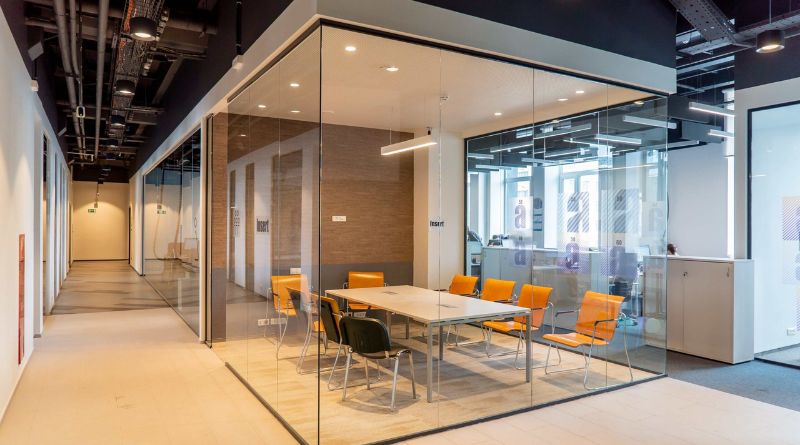Glass partition walls are interior walls that are made entirely or partially of glass panels. They are used to separate spaces within a building while still allowing natural light to flow through and provide a sense of openness. Glass partition walls can be installed in various settings, including offices, homes, retail stores, and other commercial buildings.
There are several benefits to using Glass Partition Walls from GDL Interiors. First, they allow for a more open and collaborative environment by providing visual connectivity between spaces. This is especially useful in office settings, where teamwork and communication are essential. Second, they can help to maximize natural light and reduce the need for artificial lighting, which can lead to lower energy costs. Third, they can create a modern and stylish aesthetic that enhances the overall design of a space.
When it comes to the design and installation of glass partition walls, there are several factors to consider. These include the type of glass used (such as tempered or laminated), the thickness of the glass panels, the framing system, and the hardware and accessories used for installation. It is important to work with a qualified professional who can help you select the appropriate materials and design a partition wall that meets your specific needs and preferences.
How to choose best quality Glass Partition Walls
Choosing the best quality glass partition walls involves considering several factors, including:
- Type of Glass: The type of glass used for partition walls can vary, including tempered, laminated, and double glazed glass. Tempered glass is the most common choice due to its safety and durability, while laminated glass is more resistant to breakage and offers sound insulation. Double glazed glass provides superior thermal insulation, making it ideal for environments that require temperature control.
- Thickness of Glass Panels: The thickness of the glass panels is also an important consideration. Thicker glass panels are more durable and can withstand higher impacts and heavier loads. The thickness of the glass panels can also affect the sound insulation and thermal performance of the partition wall.
- Framing System: The framing system provides structural support for the glass panels and can be made of various materials, including aluminum, steel, or wood. The framing system should be strong enough to support the weight of the glass panels and should be designed to accommodate any necessary hardware or accessories.
- Hardware and Accessories: The hardware and accessories used for glass partition walls can vary, including handles, locks, hinges, and channels. These components should be made of high-quality materials and should be designed to provide optimal functionality and durability.
- Professional Installation: The installation of glass partition walls should be done by a qualified professional to ensure proper fit, function, and safety. A professional can also help to select the best quality materials and design a partition wall that meets your specific needs.
Overall, choosing the best quality glass partition walls involves selecting high-quality materials, designing a robust framing system, and ensuring proper installation by a qualified professional.
Are glass partition walls expensive?
The cost of glass partition walls can vary depending on several factors, including the type of glass, the thickness of the glass panels, the framing system, and the hardware and accessories used for installation. Generally, glass partition walls tend to be more expensive than traditional drywall or stud partition walls.
However, the cost of glass partition walls may be offset by several benefits they offer, such as maximizing natural light, enhancing the aesthetic appeal of a space, and creating a more open and collaborative environment. Additionally, glass partition walls may offer long-term cost savings through reduced energy costs due to increased natural light and improved thermal performance.
The cost of glass partition walls can also depend on the size and complexity of the installation, as well as the location and availability of materials and labor. It is recommended to obtain quotes from multiple suppliers and installers to compare pricing and ensure that you are getting the best value for your investment.
Why use glass partition wall?
Glass partition walls offer several benefits that make them a popular choice in many settings, including:
- Natural Light: One of the most significant benefits of glass partition walls is that they allow natural light to flow through a space. This can help to reduce the need for artificial lighting and create a brighter, more open environment.
- Aesthetic Appeal: Glass partition walls can enhance the visual appeal of a space by creating a modern and stylish look. They can also be customized to fit specific design preferences and can include various decorative elements, such as frosted or colored glass.
- Sound Insulation: Glass partition walls can provide sound insulation, which can help to reduce noise levels between different areas within a building. This can be especially beneficial in offices or other commercial settings where privacy and concentration are essential.
- Durability: Glass partition walls are made of high-quality materials and are designed to be durable and long-lasting. They can withstand impacts and wear and tear, and they require minimal maintenance over time.
- Flexibility: Glass partition walls are flexible and can be easily moved or reconfigured to accommodate changing needs within a space. This can be particularly useful in commercial settings where the layout may need to be adjusted frequently.
Overall, glass partition walls offer a range of benefits that can improve the functionality, aesthetics, and overall value of a space.
